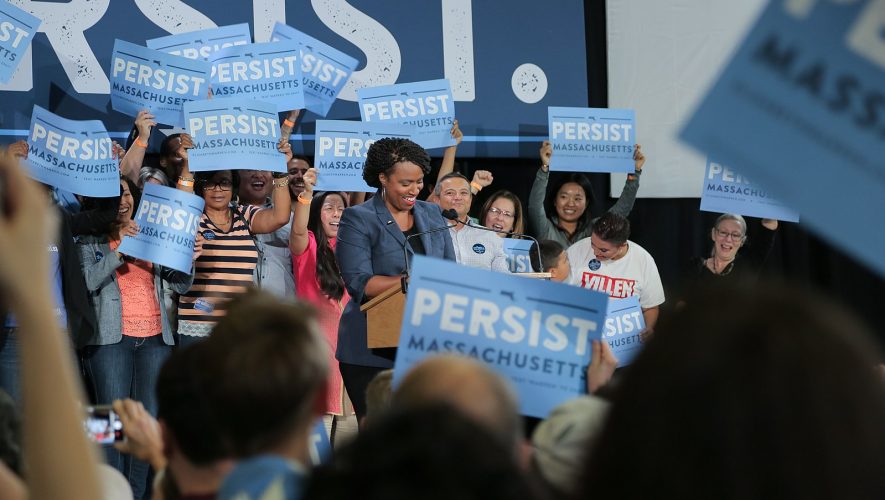Two years ago, Sarah Groh was taken out of the Senate building in handcuffs. She had been arrested for protesting proposed new restrictions on the Affordable Care Act (ACA). She was fighting for her mother, who had recently been diagnosed with leukemia and was relying on the ACA to afford treatment.
Today, Groh works in the same set of buildings that she was arrested in. She’s Democratic Representative Ayanna Pressley’s Chief of Staff, promoted from campaign manager after their election victory in 2018. She is working on national healthcare justice legislation, and her mother is in remission.
“It is very full circle, it is not lost on me,” said Groh. “I’m reminded every day of what it felt like to be in this building and to have doors slammed in my face and be told that there was nothing we could do, and I think I’ve learned in that time that there’s always something we can do.”
I sat down with Groh to talk about turning out new voters, the 2020 presidential campaign, and what it felt like to tell Ayanna Pressley that she had just won a seat in Congress. This is a transcript of our conversation, edited for length and clarity.
MM: How did you get involved with the Pressley campaign for the Massachusetts 7th Congressional District seat?
SG: I started volunteering with the campaign [in 2018], helping her out with meet and greets . . . and then I raised my hand to start writing policy briefs for her . . . I remember there was one day where there was a group, a kitchen cabinet of twenty people she brought around this table, and this was like the most pivotal, impactful moment of my life to be able to bring to bear some value at the table with someone that is a political hero of mine. A couple weeks later that table is like, ten of us, then five of us, and then she was looking for a campaign manager . . . I’m incredibly grateful she took a chance on me.
MM: What are the duties of a campaign manager for a national campaign?
SG: We focused a lot on organizing work; it felt at times more like an organizing campaign than a political campaign . . . I kind of was where she was many times. So whether we were at community meetings or driving around the district, my car became like a working office for us, and so obviously I think the position was a lot of that, and a lot of incredible volunteers were involved in this campaign. It was my job to have her back and be at her elbow.
MM: Has your role changed a lot now that you are her chief of staff?
SG: The values and the vision haven’t changed. She was so clear from the get-go on why this moment in time and what she wanted to accomplish as a member of Congress. I think what has changed is the tools we have at our disposal.
MM: Does “The Squad”—the collaborative ethos between Congresswomen Pressley, Rashida Tlaib, Alexandria Ocasio-Cortez, and Ilhan Omar—extend to the staff level?
SG: The relationship there is real, the relationship definitely extends to the staff level. I talk to those other three Chiefs of Staff very frequently, and I think so much up here is relationship-based, right? My boss will always say ‘The Squad is big, it’s not four people,’ and I believe that vehemently. I believe it is all of our teams. I believe it is all our supporters who sent us here.
MM: According to WBUR, 24 percent of the people who voted for Ayanna Pressley had not voted in the last five elections. What did you do that was so successful at turning out new voters?
SG: A campaign can’t be about the transaction of a vote, right? Before you ask someone for their vote you have to ask them, what are their stories and what are their struggles and what are their daily lives like. And so we’ve spent a lot of time in a lot of rooms and a lot of communities that I think have historically been marginalized . . . We are spending our time there because if we have the privilege of going to Congress, we represent those families too.
MM: Did you and Ayanna always agree on campaign strategy and messaging?
SG: I think she and I had each other’s back and were on the same page, that’s the job. She and I are very deliberate, there’s a very strong kind of bond of trust between us, it’s unlike any other kind of relationship I’ve ever seen on the Hill or in other jobs I’ve held.
MM: Ayanna will be back up for election in 2020. Will you be acting as campaign manager?
SG: My intention at this point is to continue to act as her Chief [of Staff] for as long as I’m of service, and I’m really grateful to be with her.
MM: What do you think that the 2020 Democratic presidential primary campaigns could take away from the lessons learned from campaigns like the Pressley campaign?
SG: You have to redraw the map, first and foremost. Your campaign strategy has to bring in folks that have not been a part of the process before . . .
My second point is that the way you do that matters, and so I really think that means you need people and an organization that is focused on organizing, that is responsive to the communities that it serves, and that is not shying away from what’s possible . . .
The third thing is we need to be very intentional about our staff pipeline. It is so important that we have diverse teams, diverse across every dimension, like age, race, gender, sexual orientation . . . We need to make diversity a priority, and not just because it’s the right thing to do morally — it is, and that should be enough — but I also think it is inherent to our ability to win.
MM: Watching the 2020 campaigns so far, is there anything that you think is being done really badly?
SG: I know how hard it is to run a campaign so I always, any time I see a staffer from any Democratic campaign I’m like ‘how are you doing, have you had a vegetable today, is someone in your life making sure you’ve slept,’ you know? So I’m kind of focused on the people behind it. I know how hard it can be but I also know how worth it it can be . . . I don’t do much Monday morning quarterbacking.
MM: What is it like to actually work with Ayanna?
SG: I just have tremendous respect for her . . . I won’t say we need more people like her in Congress, because what we need in Congress is people who are authentically themselves, people that are like her in that way.
MM: Are there any issues that your office works on that you connect with on a really personal level?
SG: One that is present for me every day is the issue of healthcare justice. Almost two years ago to the day . . . I called my mom when she was diagnosed with leukemia, and she hit a cap in her insurance probably within the first two weeks of treatment. And she was going to lose her medical care. At this moment when everything was so touch and go and she was fighting for her life, she was about to have her health insurance taken away from her . . . [with the Affordable Care Act] we were able to buy her an exchange and get her the care she needed to save her life. And so she still incurred a lot of medical debt, but she was given a sixteen percent chance of survival and she’s here today and she’s in remission.
About two years ago, one of the attempts to restrict it that the Republican House and Senate had been pushing was going to be a real blow to the ACA. I and many many others . . . tried to block the hearing and I got arrested for that, right in the Senate, and put in handcuffs and taken out of the building. And so my team will often say to me like, does it still feel a little weird that you’re in this building not in protest but as a chief of staff? And it does sometimes.
MM: What was it like to be in the room when she realized she had won the 2018 primary campaign?
SG: I’d been in the [campaign strategy room] since 4:00 a.m. and I’d gone down to the Union Hall to check back in. And we’d been waiting for some more returns to come in, and my staff member had just taken a phone call and turns to me and says ‘We did it, we did it, we won!’ I was just in complete shock, and you know we had a moment in that room with the staff, and then we went next door and someone said to me on the way in, “Sarah, you have to be the one to tell her,” you know? And I was like ‘oh my god, what do I even say?’ At this point we’re all very emotional, we’re starting to tear up, and I open the door and she just locks eyes with me and she says ‘What is it, is everything okay?’ And I say ‘Everything is great, we just wanted to say hello to our next Congresswoman.’ And then we walked in.



